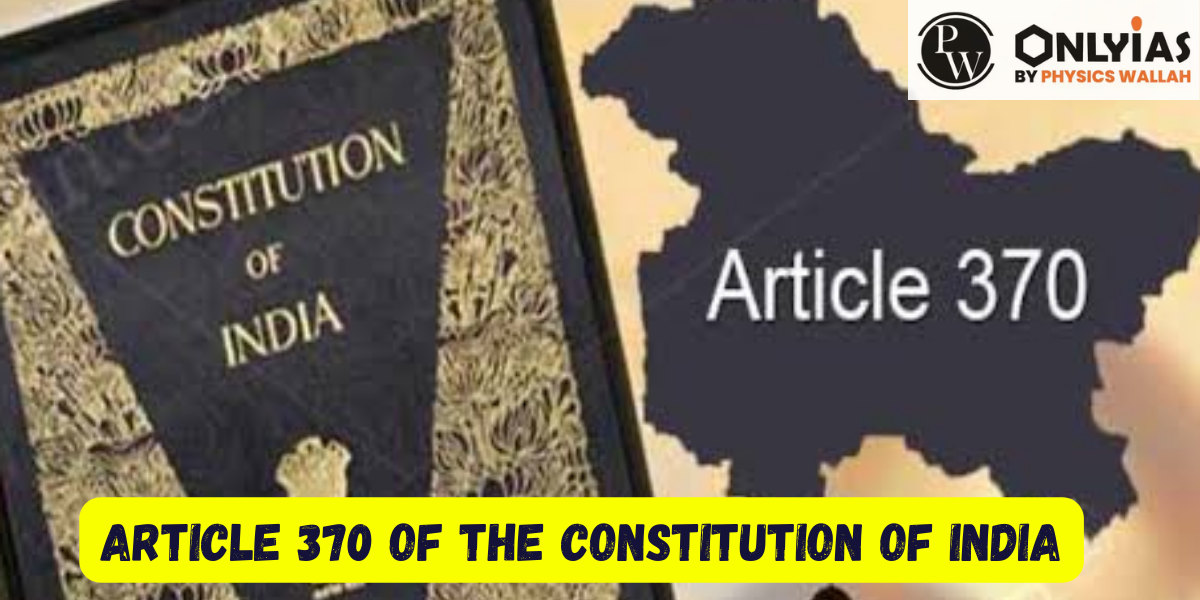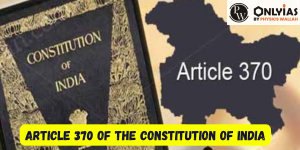![]() Madhavi Gaur
Madhavi Gaur
![]() February 24, 2024 12:35
February 24, 2024 12:35
![]() 6785
6785
![]() 0
0

Supreme Court on Article 370
Recently, Constitution Bench headed by Chief Justice of India (CJI) D.Y. Chandrachud unanimously upheld the Central government’s 2019 decision to abrogate Article 370 of the Constitution which conferred special status on the erstwhile State of Jammu and Kashmir (J&K).
Article 370 is one of the most contentious and debated provisions in the Constitution of India. It grants special autonomy to the region of Jammu and Kashmir, allowing it to have its own constitution, flag, and significant decision-making powers. Enshrined in the Constitution, Article 370 has been a subject of immense political, legal, and social discussions since its inception. In this article, we will explore the origins, provisions, significance, and controversies surrounding Article 370.
Jammu and Kashmir, located in the northern region of the Indian subcontinent and a part of the broader Kashmir area, has been a focal point of conflict involving India, Pakistan, and China since 1947. The region was accorded special status under Article 370 of the Indian constitution, which granted it the privilege of having its own constitution, state flag, and internal administrative autonomy while being governed as a state by India from 1952 until October 31, 2019.

Part XXI of the Indian Constitution, titled “Temporary, Transitional, and Special Provisions,” is where Article 370 was formulated. As per this provision, the Jammu and Kashmir Constituent Assembly had the authority to suggest the extent to which the Indian Constitution should be applied to the state. Depending on the recommendations made by the state assembly, Article 370 could even be completely revoked, leading to the application of the entire Indian Constitution to the state.
After the state constituent assembly convened, it put forth recommendations concerning the specific provisions of the Indian Constitution that should be applicable to Jammu and Kashmir. Based on these recommendations, a presidential order was issued in 1954. However, since the state constituent assembly disbanded without proposing the repeal of Article 370, it was assumed that this provision had become a permanent part of the Indian Constitution.
Article 370 came into being as a result of negotiations between the leaders of Jammu and Kashmir and the Indian government during the process of India’s accession to the Dominion of India after independence in 1947. The provision was incorporated in the Constitution to address the concerns of the princely state of Jammu and Kashmir, respecting its unique history, culture, and autonomy.
On August 5, 2019, the Government of India issued a Presidential Order that replaced the previous order from 1954, effectively subjecting Jammu and Kashmir to all articles of the Indian Constitution.
The order was based on a resolution that received a two-thirds majority in both chambers of the Indian parliament. As a result, all clauses of Article 370, except for clause 1, were rendered inoperative by a subsequent order on August 6.
In addition to this, the parliament also approved the Jammu and Kashmir Reorganization Act, 2019, which led to the division of the state of Jammu and Kashmir into two Union Territories: Jammu and Kashmir, and Ladakh. This restructuring took place on October 31, 2019.
Following the government’s intention to repeal Article 370 of the Constitution, the Supreme Court of India received a total of 23 petitions. In response, a five-judge bench was formed to address the legal challenges.
Article 370 of the Indian Constitution: The Instrument of Accession
In October 1947, Maharaja Hari Singh, the ruler of Kashmir at that time, signed an Instrument of Accession, outlining three specific areas in which Jammu & Kashmir would cede its authority to the Indian government. These areas were:
1. Foreign affairs
2. Defense
3. Communications
In March 1948, Maharaja Hari Singh appointed Sheikh Abdullah as the prime minister of the state’s temporary administration. Subsequently, Sheikh Abdullah and three other associates became part of the Indian Constituent Assembly in July 1949. Together, they worked to negotiate Jammu & Kashmir’s unique status, leading to the approval of Article 370. It was Sheikh Abdullah who played a significant role in drafting the contentious clause that granted special autonomy to the state.

Under Article 370, Jammu and Kashmir enjoy a special status, granting it considerable autonomy in comparison to other states of India. The state has its own constitution and flag, and its residents enjoy dual citizenship, with separate laws governing matters related to citizenship, ownership of property, and fundamental rights.
Article 370 acknowledges the special status of Jammu and Kashmir, granting it autonomy and the ability to enact laws for its permanent residents. These residents enjoy exclusive benefits in areas such as housing, real estate, education, and government employment, not available to others.
As per certain Kashmiri officials, Article 35A of the Indian constitution prevents the contesting of any state law solely on the basis of it violating rights guaranteed to all Indian residents by the national constitution.
The Indian Constitution’s Fundamental Rights were made partially applicable to Kashmir through the 1954 Presidential order, with some reservations. Subsequently, the state assembly made further changes, introducing “preventive detention laws” shielded from human rights complaints for 25 years. This has led to concerns about weaker human rights standards in the state of Jammu and Kashmir due to its autonomy and unique status.
Article 370 restricts the application of Indian laws in Jammu and Kashmir. The Parliament’s jurisdiction is limited to matters related to defense, foreign affairs, finance, and communications, while other provisions of the Indian Constitution are not automatically applicable to the state unless approved by its own government.
Article 370 of the Constitution of India restricts the application of Indian laws in the state of Jammu and Kashmir. The provision grants special autonomy to the region, allowing it to have its own constitution and laws.
Residents of Jammu and Kashmir are governed by separate citizenship, property, and fundamental rights laws compared to the rest of India. Article 370 prohibits residents of other states from purchasing real estate in Jammu and Kashmir. Additionally, Article 370 does not grant the Centre the authority to declare a state financial emergency.
It is important to highlight that Article 370(1)(c) specifically mentions the application of Article 1 of the Indian Constitution to Kashmir. Article 1 lists the Union’s states, indicating that Jammu and Kashmir is bound to the Indian Union by Article 370. Unless new overriding laws are enacted, the removal of Article 370, which can be done through a Presidential Order, would make the state independent of India.
Both India and Pakistan claim full sovereignty over the Himalayan territory of Kashmir. The region, previously known as Jammu and Kashmir, became part of India in 1947 after the partition of the subcontinent following the end of British rule. A ceasefire line was agreed upon after India and Pakistan went to war over the territory, leading to their control over separate portions of the area.
The state of Jammu and Kashmir, controlled by India, has witnessed violence for three decades due to a separatist uprising against Indian rule.
Other provisions of the Indian Constitution are not automatically applicable to Jammu and Kashmir unless explicitly approved by its own government. This unique arrangement was designed to respect the region’s distinct identity and history while integrating it into the broader framework of the Indian federal structure.
The significance and rationale behind Article 370 lie in its role as a bridge between regional aspirations and national integration. It recognizes the distinct identity of the state of Jammu and Kashmir while ensuring its inclusion in the larger fabric of the Indian Union. However, over the years, the provision has been a subject of controversy and debate, with differing perspectives on its impact on the region and its integration with the rest of India. The future of Article 370 will continue to be a topic of discussion, reflecting the ongoing endeavor to balance regional autonomy with national unity in India’s diverse and democratic landscape.
The significance and rationale behind Article 370 can be understood through the following points:
1. Preserving Regional Identity: One of the primary rationales behind Article 370 was to respect and preserve the unique identity, history, and culture of the state of Jammu and Kashmir. The provision acknowledges the region’s distinctiveness and allows it to have its own constitution, flag, and significant decision-making powers.
2. Addressing Historical Context: The inclusion of Article 370 was a response to the specific historical context of Jammu and Kashmir’s accession to India after independence in 1947. The provision was a result of negotiations between the leaders of the state and the Indian government to address the concerns and aspirations of the people of Jammu and Kashmir.
3. Accommodating Regional Aspirations: India’s federal structure aims to accommodate diverse regional aspirations while fostering national unity. Article 370 reflects this spirit by granting special autonomy to Jammu and Kashmir within the framework of the Indian Constitution. It recognizes the need for regional flexibility and self-governance.
4. Safeguarding Territorial Integrity: Article 370 plays a role in safeguarding the territorial integrity of Jammu and Kashmir within the Indian Union. The provision affirms that the state is an integral part of India while allowing it certain unique privileges and autonomy.
5. Promoting Harmonious Relations: The provision was intended to promote harmonious relations between the region of Jammu and Kashmir and the rest of India. By granting special status, it aimed to create a sense of trust and cooperation between the state and the central government.
6. Upholding Democratic Principles: Article 370 exemplifies India’s commitment to democratic principles by respecting the choice of the people of Jammu and Kashmir to have their own constitution and laws. It exemplifies the idea of “unity in diversity” by accommodating the region’s specific needs within the larger democratic framework.
Over the years, Article 370 has been a subject of criticism and controversy. Some argue that the special status granted to Jammu and Kashmir perpetuates separatist sentiments and hampers its full integration with the rest of India. Critics also claim that the provision has been misused by some political leaders for personal gains, leading to a lack of development and accountability in the region.
Here are some of the main controversies and criticisms surrounding Article 370:
1. Limited Integration: Critics argue that Article 370 has hindered the full integration of Jammu and Kashmir with the rest of India. They believe that the provision has perpetuated a sense of separatism and prevented the region from fully embracing its Indian identity.
2. Unequal Treatment: Article 370 provides special privileges and benefits to the residents of Jammu and Kashmir, including exclusive rights in matters of property ownership, education, and employment in the government. Critics argue that this has led to a sense of unequal treatment and discrimination against citizens from other parts of India.
3. Hindrance to Development: Some critics contend that the special status granted to Jammu and Kashmir has hindered its development. They believe that the region’s autonomy has limited the central government’s ability to implement welfare and development programs effectively.
4. Misuse of Autonomy: Over the years, there have been allegations of misuse of the autonomy granted under Article 370 by certain political leaders. Critics claim that this has led to a lack of accountability and transparency in governance, resulting in the mismanagement of resources and governance in the state.
5. Security Concerns: Article 370’s special provisions have also been criticized for impeding the application of certain central laws related to security and anti-terrorism measures in Jammu and Kashmir. Critics argue that this has compromised national security and hindered the fight against terrorism.
6. Legal Complexity: The intricate legal framework surrounding Article 370 has led to legal complexities and ambiguities. The special status granted to the state has led to debates and disputes over various issues, further complicating matters.
7. Opposition from Certain Political Groups: Some political groups and parties have opposed Article 370, arguing that it hinders the uniformity and equal treatment of all states within the Indian Union. They advocate for its abrogation to promote a more unified and integrated India.
Article 370 has been a subject of heated controversies and criticisms, with varying perspectives on its impact on the region of Jammu and Kashmir and its integration with the rest of India. While proponents argue that it respects the region’s distinct identity and fosters a sense of autonomy, critics highlight concerns of unequal treatment, development hindrance, and national security issues.
The debate over Article 370 continues, reflecting the complex and sensitive nature of addressing regional autonomy within India’s diverse federal structure.
Several attempts have been made to amend or revoke Article 370. However, any changes to this provision require the consent of the Jammu and Kashmir Constituent Assembly, which makes it challenging to modify. Additionally, there have been different interpretations and court rulings regarding the scope and extent of Article 370, further adding to the complexity of the matter.
Article 370 of the Constitution of India has undergone various constitutional amendments and interpretations over the years. These changes and interpretations have shaped the application and scope of the provision. Here are some key aspects of Article 370’s constitutional amendments and interpretations:
1. Presidential Orders: Since its inclusion in the Constitution, Article 370 has been modified through a series of Presidential orders. These orders have extended the application of various provisions of the Indian Constitution to Jammu and Kashmir, gradually integrating the state with the rest of India.
2. Fundamental Rights: Initially, Jammu and Kashmir had its own set of fundamental rights, which were different from those in the Indian Constitution. However, the 1954 Presidential order extended some of the Fundamental Rights to the state, with certain exceptions and modifications.
3. Application of Central Laws: Over time, several central laws have been extended to Jammu and Kashmir through Constitutional amendments and Presidential orders. These include laws related to citizenship, banking, finance, and other important matters.
4. Abrogation of Article 35A: In August 2019, the Indian government abrogated Article 35A, which granted special rights and privileges to the permanent residents of Jammu and Kashmir. The abrogation aimed to provide equal rights and opportunities to all Indian citizens in the state.
5. Scrapping of State’s Special Status: In the same move, the Indian government also revoked the special status of Jammu and Kashmir by revoking Article 370. This historic decision was aimed at fully integrating the state with the Indian Union and treating it on par with other states.
6. Legal Challenges: The constitutional amendments and interpretations related to Article 370 have faced legal challenges in various courts. Some have questioned the validity of the amendments, while others have sought clarification on the scope and implications of the changes.
7. Interpretations by the Supreme Court: The Supreme Court of India has played a crucial role in interpreting the various aspects of Article 370 and its implications. Its rulings have provided guidance on matters related to the application of central laws and constitutional provisions in Jammu and Kashmir.
Article 370 remains a critical aspect of India’s constitutional landscape, embodying the delicate balance between regional autonomy and national integration. While it has provided a unique framework for Jammu and Kashmir’s governance, it has also been a subject of political debates and controversies.
The future of Article 370 will continue to be a subject of discussion, reflecting India’s ongoing endeavor to reconcile unity with diversity and uphold the principles of democracy and federalism.
Important Articles of Indian Constitution Complete List 2023
First in India Comprehensive List in 77 Years of Independence of India
<div class="new-fform">
</div>

Latest Comments